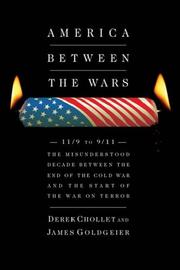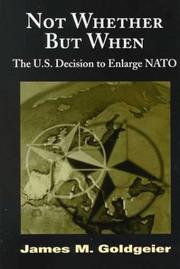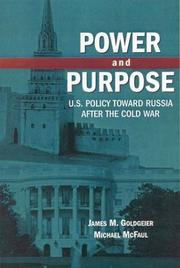| Listing 1 - 10 of 13 | << page >> |
Sort by
|

ISBN: 9781586484965 9781586487058 1586484966 9781586487058 1586487051 Year: 2008 Publisher: New York PublicAffairs
Abstract | Keywords | Export | Availability | Bookmark
 Loading...
Loading...Choose an application
- Reference Manager
- EndNote
- RefWorks (Direct export to RefWorks)
Berlijnse muur (1961-1989) --- Berlin Wall (Berlin, Germany) (1961-1989) --- Mur de Berlin (1961-1989) --- Political culture --- Social change --- Berlin Wall, Berlin, Germany, 1961-1989 --- September 11 Terrorist Attacks, 2001 --- World politics --- Culture politique --- Changement social --- Mur de Berlin --- Attentats du 11 septembre 2001, Etats-Unis --- Politique mondiale --- History --- Influence --- Histoire --- United States --- Etats-Unis --- Politics and government --- Foreign relations --- Social conditions --- Politique et gouvernement --- Relations extérieures --- Conditions sociales --- Berlin (Allemagne) -- Berliner Mauer --- Berlin (Allemagne) -- Mauer --- Berlin (Allemagne) -- Mur de Berlin --- Berlin [Mur de ](1961-1989) --- Berlin wall (1961-....) --- Berliner Mauer (1961-1989) --- Berliner Mauer (Berlin, Deutschland) (1961-1989) --- Mur de la honte (1961-1989) --- Muro de Berlim (1961-1989) --- Relations extérieures --- 1989 --- -United States --- 1980 --- -Political culture --- 20th century --- September 11 terrorist attacks, 2001

ISBN: 081573171X Year: 1999 Publisher: Washington (D.C.) : Brookings institution,
Abstract | Keywords | Export | Availability | Bookmark
 Loading...
Loading...Choose an application
- Reference Manager
- EndNote
- RefWorks (Direct export to RefWorks)
Book
ISBN: 0801848660 Year: 1994 Publisher: Baltimore, Md Johns Hopkins University Press
Abstract | Keywords | Export | Availability | Bookmark
 Loading...
Loading...Choose an application
- Reference Manager
- EndNote
- RefWorks (Direct export to RefWorks)

ISBN: 0815731728 Year: 1999 Publisher: Washington, D.C. Brookings Institution
Abstract | Keywords | Export | Availability | Bookmark
 Loading...
Loading...Choose an application
- Reference Manager
- EndNote
- RefWorks (Direct export to RefWorks)
Polemology --- NATO

ISBN: 0815731736 0815731744 Year: 2003 Publisher: Washington (D.C.) : Brookings institution,
Abstract | Keywords | Export | Availability | Bookmark
 Loading...
Loading...Choose an application
- Reference Manager
- EndNote
- RefWorks (Direct export to RefWorks)
This work traces the formulation and evolution of American foreign policy toward the Soviet Union and Russia during the tumultuous and uncertain decade at the end of the Cold War. It examines how American decision-makers coped with opportunities and challenges presented by a new Russia.

ISBN: 0815731744 0815731736 Year: 2004 Publisher: Washington, D.C. Brookings Institution
Abstract | Keywords | Export | Availability | Bookmark
 Loading...
Loading...Choose an application
- Reference Manager
- EndNote
- RefWorks (Direct export to RefWorks)
International relations. Foreign policy --- United States --- Russia --- Russia (Federation) --- Foreign relations --- Officials and employees --- United States of America
Book
ISBN: 9780815731733 Year: 2003 Publisher: Washington (D.C.) Brookings Institution Press
Abstract | Keywords | Export | Availability | Bookmark
 Loading...
Loading...Choose an application
- Reference Manager
- EndNote
- RefWorks (Direct export to RefWorks)
Book
ISBN: 0876094868 9780876094860 9780876094679 0876094671 Year: 2010 Publisher: New York Council on Foreign Relations
Abstract | Keywords | Export | Availability | Bookmark
 Loading...
Loading...Choose an application
- Reference Manager
- EndNote
- RefWorks (Direct export to RefWorks)
Takes on the question of how NATO, having successfully kept the peace in Europe in the twentieth century, can adapt to the challenges of the twenty-first. Contends that NATO retains value for the United States and Europe, but that it must expand its vision of collective defense in order to remain relevant and effective. This means recognizing the full range of threats that confront NATO members today and affirming that the alliance will respond collectively to an act (whether by an outside state or a nonstate entity) that imperils the political or economic security or territorial integrity of a member state. NATO has been a cornerstone of security in Europe, and of U.S. foreign policy, for six decades. But its ability to continue playing such a central role is unclear. This report takes a sober look at what the alliance and its members must do to maintain NATO's relevance in the face of today's strategic environment.
Security, International. --- Collective security --- International security --- International relations --- Disarmament --- International organization --- Peace --- North Atlantic Treaty Organization. --- NAVO --- OTAN --- North Atlantic treaty organisation --- North Atlantic Treaty Organization
Book
ISBN: 3031233646 9783031233647 9783031233630 3031233638 Year: 2023 Publisher: Cham Palgrave Macmillan
Abstract | Keywords | Export | Availability | Bookmark
 Loading...
Loading...Choose an application
- Reference Manager
- EndNote
- RefWorks (Direct export to RefWorks)
Mobilizing an interdisciplinary group of scholars and practitioners, this book reviews the history and consequences of NATO’s post-Cold War enlargement into Central and Eastern Europe. It offers a nuanced discussion of the merits and drawbacks of NATO enlargement across the different actors involved and compares the results of the policy against potential alternatives that were not chosen. Particular attention is given to NATO enlargement’s influence on the course of U.S. foreign policy, democracy and security in Central and Eastern Europe, NATO’s own development as a political and military institution, and relations with China and Russia (including the 2022 Russia-Ukraine War). Written for an engaged audience, the book is designed to appeal to students, researchers, and policymakers alike while offering both policy insights and avenues for future scholarship.--
International relations. --- Security, International. --- International organization. --- International Relations Theory. --- International Security Studies. --- International Organization. --- Coexistence --- Foreign affairs --- Foreign policy --- Foreign relations --- Global governance --- Interdependence of nations --- International affairs --- Peaceful coexistence --- World order --- National security --- Sovereignty --- World politics --- Federation, International --- International administration --- International federation --- Organization, International --- World federation --- World government --- World organization --- Congresses and conventions --- International relations --- Peace --- Political science --- International agencies --- International cooperation --- Security, International --- Collective security --- International security --- Disarmament --- International organization --- Military policy. --- Defense policy --- Military readiness --- Military history --- Sociology, Military --- War --- Political aspects --- Polemology --- NATO --- SECURITY, INTERNATIONAL --- INTERNATIONAL RELATIONS --- MILITARY POLICY
Digital
ISBN: 9783031233647 9783031233630 9783031233654 9783031233661 Year: 2023 Publisher: Cham Springer International Publishing, Imprint: Palgrave Macmillan
Abstract | Keywords | Export | Availability | Bookmark
 Loading...
Loading...Choose an application
- Reference Manager
- EndNote
- RefWorks (Direct export to RefWorks)
Mobilizing an interdisciplinary group of scholars and practitioners, this book reviews the history and consequences of NATO's post-Cold War enlargement into Central and Eastern Europe. It offers a nuanced discussion of the merits and drawbacks of NATO enlargement across the different actors involved and compares the results of the policy against potential alternatives that were not chosen. Particular attention is given to NATO enlargement's influence on the course of U.S. foreign policy, democracy and security in Central and Eastern Europe, NATO's own development as a political and military institution, and relations with China and Russia (including the 2022 Russia-Ukraine War). Written for an engaged audience, the book is designed to appeal to students, researchers, and policymakers alike while offering both policy insights and avenues for future scholarship. James Goldgeier is Visiting Scholar at Stanford University's Center for International Security and Cooperation, Visiting Fellow at the Brookings Institution, and Professor of International Relations at the School of International Service at American University, where he served as Dean from 2011-17. Joshua R. Itzkowitz Shifrinson is Associate Professor with the School of Public Policy at the University of Maryland, Senior Fellow with the Center for International and Security Studies at Maryland (CISSM), and Associate Editor of H-Diplo's International Security Studies Forum (ISSF).
International relations. Foreign policy --- International law --- Criminology. Victimology --- Law --- veiligheid (mensen) --- internationale organisaties --- internationale betrekkingen
| Listing 1 - 10 of 13 | << page >> |
Sort by
|

 Search
Search Feedback
Feedback About UniCat
About UniCat  Help
Help News
News